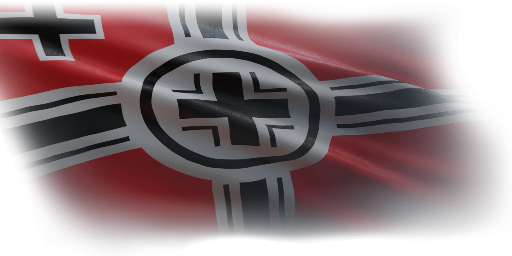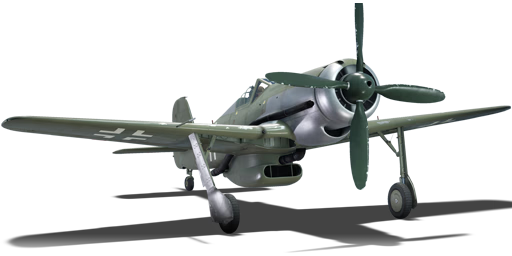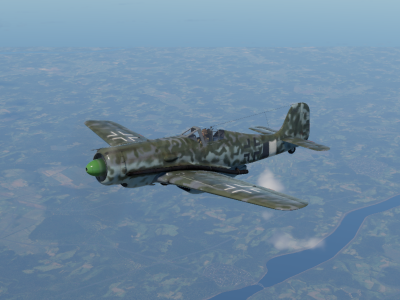


As the Allied bombing campaign strengthened, the Germans knew they needed more high-altitude fighters. One of the many high-altitude proposals and designs was the Focke-Wulf 190 C. It was to be powered by the DB 603 with a turbocharger mounted underneath the aircraft. Turbochargers worked by compressing air and providing more power even at high altitudes where the air would be considerably thinner than at sea level. The 190 C’s fuselage was also made longer to accommodate the turbocharger. Although it was quite favourable in testing and orders were put in, the 190 C would ultimately be canceled as the Fw 190 D and Ta 152 were superior aircraft.
Introduced during Update 1.85 "Supersonic" as a reward for the 2018 Festive Quest, the Fw 190 C is an experimental high-altitude focused fighter. Although the Fw 190 C looks much more different compared to the Dora variants, it still plays relatively the same. It's not suited for turnfights but excels in energy fights. The 190 C also retains a very high structural limit of over 900 km/h (562 mph) which makes it a decent boom and zoom fighter. Players do need to be cautious of going too fast as the aircraft will compress and can make it hard to get guns on target. For weaponry, the 190 C has two 7.92 mm machine guns and two 20 mm MG 151 cannons. A downgrade from the Dora and Anton variants, but the cannons can still easily destroy enemy aircraft. Overall, the Focke-Wulf 190 C is an interesting aircraft that was born out of the many designs made to counter the Allied bombing campaign.
flaps
flaps
flaps
brake
| Belt | Belt filling | Armor penetration (mm) at a distance: | |||||
|---|---|---|---|---|---|---|---|
| 10 m | 100 m | 500 m | 1000 m | 1500 m | 2000 m | ||
| IT/IT/APHE/HEI | 21 | 19 | 8 | 3 | 1 | 1 | |
| IT/HEI/HEI/AP-I | 27 | 24 | 14 | 7 | 3 | 2 | |
| AP-I/HEI/HEI/HEI/HEI/IT | 27 | 24 | 14 | 7 | 3 | 2 | |
| APHE/APHE/APHE/IT | 21 | 19 | 8 | 3 | 1 | 1 | |
| FI-T/FI-T/FI-T/IT/IT | 21 | 19 | 8 | 3 | 1 | 1 | |
| HEI/HEI/HEI/APHE/AP-I | 27 | 24 | 14 | 7 | 3 | 2 | |
| Belt | Belt filling | Armor penetration (mm) at a distance: | |||||
|---|---|---|---|---|---|---|---|
| 10 m | 100 m | 500 m | 1000 m | 1500 m | 2000 m | ||
| AP-T/AP-I/AI | 9 | 8 | 6 | 3 | 0 | 0 | |
| AP-T/AP/AI/AP-I | 13 | 12 | 7 | 3 | 2 | 0 | |
| AP-T | 9 | 8 | 6 | 3 | 0 | 0 | |
| AI/AP/AP/AP/AI | 13 | 12 | 7 | 3 | 2 | 0 | |







 2 x (100 / 230 / 475) %
2 x (100 / 230 / 475) % 
 2 x 172 %
2 x 172 % 

Flight performance | |
|---|---|
Survivability |
|---|
Weaponry | |
|---|---|
